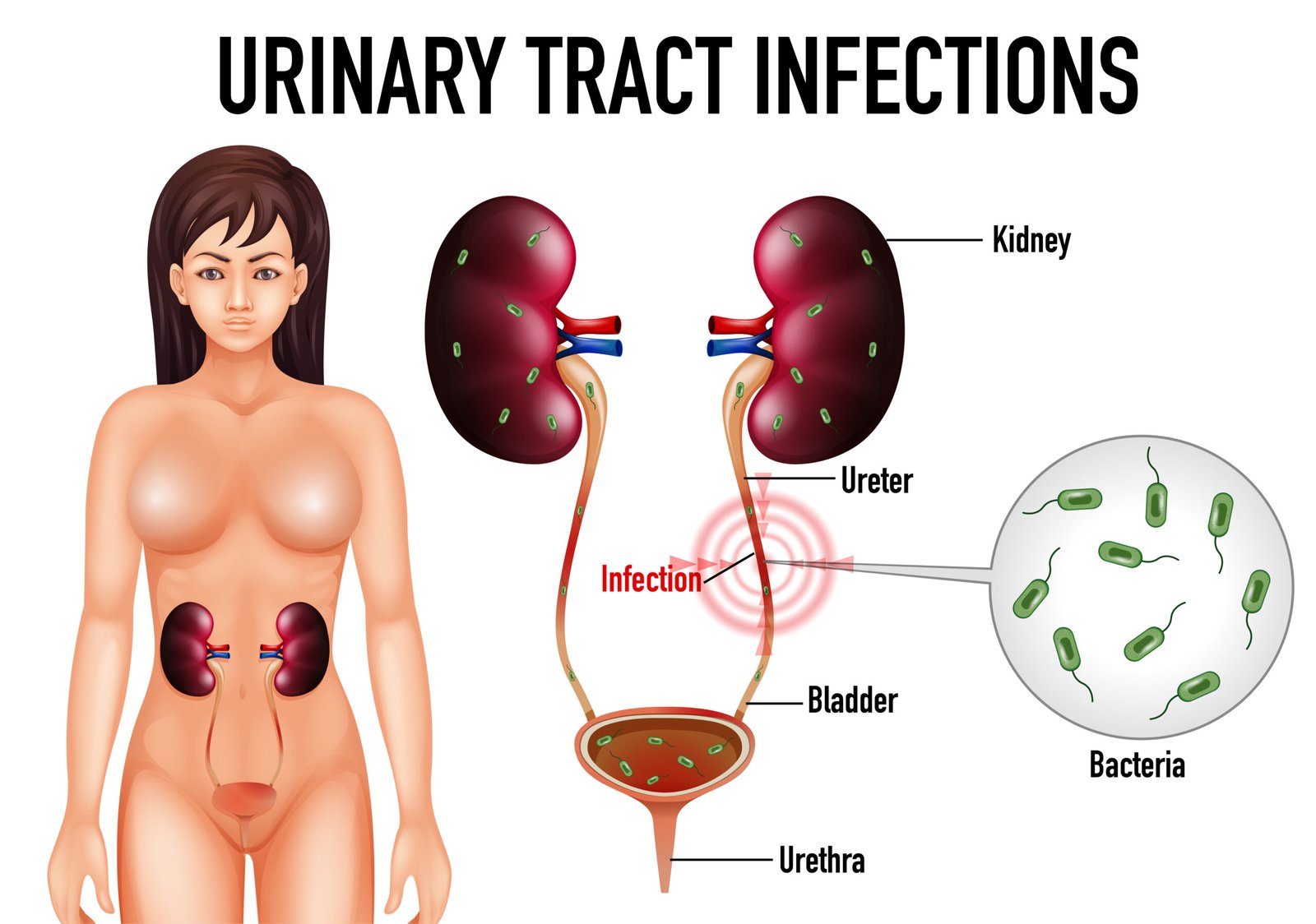Introduction
Urinary tract infections (UTIs) are a prevalent health issue affecting millions globally. They primarily affect the bladder, urethra, and kidneys, leading to a range of uncomfortable symptoms such as frequent urination, burning sensation during urination, and abdominal pain. While these symptoms are widely recognized, many may wonder: Can UTI cause headache? This article delves into the complex relationship between UTIs and headaches, exploring various mechanisms that can lead to headaches during or after a urinary tract infection.
What is an Urinary Tract Infection (UTI)?
Before discussing the relationship between UTIs and headaches, it’s essential to understand what a UTI is. A UTI occurs when harmful bacteria enter the urinary tract, leading to infection. While UTIs can occur in anyone, they are ubiquitous in women. Factors contributing to UTIs include:
- Anatomical differences: Women have shorter urethras, making it easier for bacteria to reach the bladder.
- Hormonal changes: Fluctuations in hormone levels can influence the urinary tract’s susceptibility to infections.
- Sexual activity: Intercourse can introduce bacteria into the urinary tract.
- Certain medical conditions: Conditions like diabetes and urinary tract abnormalities can increase the risk of developing UTIs.
Common Symptoms of a UTI
The most common symptoms of a urinary tract infection include:
- Frequent urge to urinate: A persistent feeling of needing to urinate, often with little urine produced.
- Burning sensation: Pain or discomfort during urination is a hallmark symptom of UTIs.
- Cloudy or strong-smelling urine: Changes in the appearance and odor of urine can indicate an infection.
- Pelvic pain: Discomfort in the lower abdomen may accompany other UTI symptoms.
The Link Between UTI and Headaches
While many individuals associate UTIs with their typical symptoms, they may also experience unusual symptoms, including headaches. This leads to the question: What is the connection between urinary tract infection headache and UTI-related headaches?
Can UTI Cause Headache?
The short answer is yes; a UTI can cause headaches in some individuals. Here are several mechanisms through which a UTI can cause headaches:
- Inflammation and Immune Response: When the body detects an infection, the immune system activates an inflammatory response to fight the invading bacteria. This process can release cytokine mediators, leading to systemic inflammation. Inflammation can cause pain and discomfort, which may manifest as a headache. Thus, the headache can be seen as a secondary response to the primary infection.
- Dehydration: Frequent urination, a common symptom of UTIs, can lead to dehydration. Dehydration is a well-known trigger for headaches. When the body loses more fluids than it takes in, it can result in a reduced blood volume, leading to decreased oxygen flow to the brain and resulting in a headache.
- Fever: UTIs can lead to fever, mainly if the infection spreads to the kidneys (pyelonephritis). Fever can trigger various systemic symptoms, including headaches. The body’s attempt to regulate temperature can also result in headaches, mainly if the fever is high or prolonged.
- Stress and Fatigue: Dealing with a UTI can be stressful and exhausting. The physical discomfort associated with the infection can lead to increased stress levels and fatigue, leading to headaches.
UTI Headache: Symptoms and Types
The symptoms of a UTI headache can vary from mild discomfort to severe pain. Here are the common types of headaches associated with UTIs:
- Tension Headaches are the most common type of headaches, often characterized by a dull, aching pain and tightness around the forehead or back of the head. Stress and fatigue from dealing with a UTI can trigger tension headaches.
- Migraine Headaches: Migraines are characterized by severe throbbing pain, often on one side of the head, accompanied by nausea and sensitivity to light and sound. For individuals prone to migraines, a UTI migraine headache may occur, triggered by the body’s inflammatory response, dehydration, or hormonal changes.
- Cluster Headaches: Though less common, cluster headaches can occur in some individuals during infections. These severe headaches occur in groups or clusters, often lasting several weeks.
Bladder Infection and Headache: What’s the Connection?
A bladder infection is a specific type of UTI primarily affecting the bladder. It is also known as cystitis. Many individuals experiencing a bladder infection cause headaches due to the exact mechanisms discussed earlier. The inflammation, fever, dehydration, and stress associated with a bladder infection can contribute to headaches.
When a bladder infection occurs, the symptoms may overlap with headaches, leading individuals to misinterpret their discomfort. Some symptoms of a bladder infection that can lead to headaches include:
- Persistent Pelvic Pain: The pain associated with bladder infections can extend beyond the lower abdomen and may contribute to headache discomfort.
- Urinary Symptoms: The constant urge to urinate and discomfort during urination can lead to frustration and stress, which can trigger headaches.
UTI and Headache: Understanding the Relationship
The relationship between UTIs and headaches can be complex. While not everyone with a UTI will experience headaches, those who do may find that various factors associated with the infection exacerbate their headaches.
Factors Influencing UTI-Related Headaches
Several factors may contribute to the occurrence of headaches in individuals with UTIs:
- Severity of the Infection: More severe infections may lead to more pronounced symptoms, including headaches. If the infection spreads to the kidneys, it can lead to more systemic symptoms, including high fever and significant headaches.
- Individual Sensitivity: Some individuals are more prone to headaches due to pre-existing conditions or a history of migraines. For these individuals, a UTI can serve as a trigger for a headache.
- Hydration Status: Individuals who are not adequately hydrated during a UTI may experience more pronounced headaches. Drinking sufficient fluids can help alleviate headache symptoms.
- Medication Side Effects: Certain medications used to treat UTIs may cause side effects, including headaches. Understanding the potential side effects of antibiotics and other medications is essential for managing symptoms.
Managing UTI-Related Headaches
If you experience headaches alongside a UTI, it’s essential to manage both conditions effectively. Here are some strategies for alleviating symptoms:
- Stay Hydrated: Drinking fluids can help prevent dehydration, which is crucial for managing headaches and UTI symptoms. Aim for at least 8–10 glasses of water daily, especially when experiencing a UTI.
- Rest: Giving your body time to heal is essential. Stress can exacerbate headaches, so finding ways to relax and reduce stress can help alleviate symptoms.
- Pain Relief Medication: Over-the-counter pain relievers such as ibuprofen or acetaminophen can help manage headaches. Always consult with a healthcare provider before starting any new medications.
- Treat the Underlying Infection: Ensuring that the UTI is treated promptly and effectively is crucial for preventing complications and managing associated symptoms, including headaches.
- Consult a Healthcare Provider: If headaches persist despite managing UTI symptoms, consult a healthcare provider. They may recommend further evaluation to rule out other underlying causes of headaches.
When to Seek Medical Attention
While mild headaches may be manageable at home, certain situations warrant medical attention. If you experience any of the following symptoms, seek medical care promptly:
- Severe or worsening headache: If your headache becomes debilitating or does not respond to over-the-counter medications.
- High fever: A fever over 101°F (38.3°C), especially if accompanied by a headache, may indicate a more serious infection.
- Confusion or dizziness: These symptoms may signal a severe infection that requires immediate medical attention.
- Persistent vomiting: It may indicate a more serious condition if you experience nausea and vomiting alongside your UTI and headache
Conclusion
In summary, the relationship between UTIs and headaches is multifaceted. While not everyone with a urinary tract infection will experience headaches, it is clear that infections can trigger headaches through various mechanisms, including inflammation, dehydration, fever, and stress. Understanding this connection is crucial for effectively managing conditions and improving overall well-being.
If you are experiencing headaches alongside UTI symptoms, consider taking proactive steps to manage hydration, reduce stress, and seek treatment for the infection. Always consult a healthcare provider if you have concerns about your symptoms or if they persist, as they can provide valuable guidance and support.

Frequently Asked Questions (FAQs)
1. Can UTI cause headache even if it’s just in the bladder?
Yes, a bladder infection can cause headaches due to the inflammation and irritation associated with the infection.
2. How do I relieve a UTI-related headache?
Stay hydrated, rest, and consider using over-the-counter pain relievers to manage headache pain. Treating the UTI is essential for overall relief.
3. Should I worry if I have both a UTI and a headache?
If your headache is severe or accompanied by high fever, confusion, or dizziness, you should seek medical attention immediately.
4. Can migraines be triggered by a UTI?
Yes, UTIs can trigger migraines, especially in individuals who are prone to them. The body’s inflammatory response and dehydration can be significant triggers.
5. How long does a headache from a UTI last?
The duration of a headache caused by a UTI varies depending on the severity of the infection and individual health. It should subside as the disease is treated.











